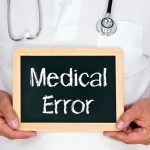Category Archives: Medical Malpractice

Family Gets Settlement From Hospital After Baby Falls From NICU Crib
The first days at home with a newborn baby are overwhelming. In their first months of life, human infants are so fragile, and the simplest functions of life require arduous work from multiple caregivers. Babies know when they are hungry, but they do not always easily take milk when it is offered to them,… Read More »

Hospital Faces Lawsuit From Family Of Patient Who Suffered Fatal Injuries In Preventable Fall At Hospital
Near the main entrance of a hospital, you often see staff members bringing patients who have recently been discharged from the hospital down to the lobby in wheelchairs, only for the patients to walk across the lobby to their family members’ cars without assistance. The rationale is that even patients who are healthy enough… Read More »

Family Receives $40 Million After Misdiagnosis Leads To Infant’s Spinal Cord Injury
Newborns, even those born at term after an uneventful pregnancy, are so tiny and fragile that the first days of a child’s life are often terrifying for the child’s parents. Advances in neonatology have made it possible for doctors to detect early warning signs of many common childhood illnesses and take appropriate actions before… Read More »

Notices Of Intent In Medical Malpractice Lawsuits
Some types of litigation require a preliminary phase before the parties can go to court and present their respective sides of the story in front of the judge. For example, in employment discrimination lawsuits, the plaintiff must first contact the Equal Employment Opportunity Commission so that it can investigate whether the plaintiff has grounds… Read More »

Is It Medical Malpractice When A Patient Dies By Suicide?
Patients who suffer harm as the result of preventable errors have the right to seek damages by filing a medical malpractice lawsuit. The families of patients who died after doctors’ actions caused the patient’s health to suffer an irreversible decline also have recourse to medical malpractice lawsuits. For example, some possible reasons for medical… Read More »

Is It Medical Malpractice When The Emergency Room Gives You Ambiguous Instructions?
If you are living with a serious, chronic illness, you often feel an instant connection to other people who have the same illness because of shared experiences that the most of the world doesn’t understand. You know about the triggers that make your symptoms worse and the generic and brand names of the medications… Read More »

Beware of the Statute of Limitations in Medical Malpractice Lawsuits Related to Missed Opportunities to Diagnose Cancer
The statute of limitations for medical malpractice lawsuits is three years. That means that you have three years to file a lawsuit, starting from the date the error occurred, such as in instances where a surgeon or anesthesiologist error injures a patient during surgery, or from the date the harm was discovered, such as… Read More »

Filing a Medical Malpractice Lawsuit After You Suffer a Preventable Allergic Reaction
If you have suffered a serious illness, your experience has probably caused you to learn a considerable amount about the subspecialty of medicine related to your diagnosis than you ever knew. For example, you might have learned a lot more about the immune system or the function of the pancreas than you ever found… Read More »

Medical Malpractice Lawsuits Related to Adverse Drug Reactions
Any drug strong enough to have a beneficial effect can also have unpleasant side effects. Consider that, while over-the-counter cold medicine clears your sinuses and suppresses your cough, it also makes you drowsy. The effect is even more pronounced with prescription drugs that some patients must take on a long-term basis in order to… Read More »

If a Patient Slips and Falls at a Hospital, Is It Premises Liability or Medical Malpractice?
In all personal injury lawsuits, you are trying to prove negligence on the part of the person or business that caused your injuries or enabled a preventable accident to happen. Premises liability and medical malpractice are two specific categories of negligence. Premises liability is when a business owner knowingly allowed dangers conditions to persist,… Read More »
